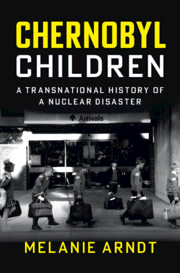Book contents
- Chernobyl Children
- Studies in Environment and History
- Chernobyl Children
- Copyright page
- Dedication
- Contents
- Figures
- Archives
- Acknowledgements
- Note on Languages
- Abbreviations
- Prologue
- 1 A Transnational Disaster: Currents and Connections
- 2 The Disaster and After
- 3 The Soviet Chernobyl Children
- 4 The Chernobyl Children as ‘Children of the Whole Planet’
- 5 The Chernobyl Children
- Concluding Remarks
- Bibliography
- Index
- Studies in Environment and History (continued from page ii)
2 - The Disaster and After
Published online by Cambridge University Press: 26 June 2025
- Chernobyl Children
- Studies in Environment and History
- Chernobyl Children
- Copyright page
- Dedication
- Contents
- Figures
- Archives
- Acknowledgements
- Note on Languages
- Abbreviations
- Prologue
- 1 A Transnational Disaster: Currents and Connections
- 2 The Disaster and After
- 3 The Soviet Chernobyl Children
- 4 The Chernobyl Children as ‘Children of the Whole Planet’
- 5 The Chernobyl Children
- Concluding Remarks
- Bibliography
- Index
- Studies in Environment and History (continued from page ii)
Summary
This chapter explores the immediate and far-reaching effects of the Chernobyl nuclear disaster of 26 April 1986. It contrasts the Soviet Union’s portrayal of nuclear power as a symbol of progress with the grim reality following Reactor No. 4’s explosion. The Soviet government’s initial response, marked by secrecy and denial, worsened the disaster’s impact on the environment and the people. Globally, the reaction was swift, with countries demanding transparency and offering assistance, which the Soviet Union officially denied but secretly accepted. The disaster fuelled widespread fear and scepticism about nuclear energy, sparking anti-nuclear protests and policy changes worldwide. In the US, Chernobyl reignited debates over nuclear safety, closely monitored by government and intelligence agencies. A poignant outcome was the plight of the ‘Chernobyl children’, who faced an uncertain future. International efforts provided these children with medical care, reflecting global solidarity. The chapter emphasizes how Chernobyl became a symbol of nuclear peril and a catalyst for humanitarian action, as the world grappled with the lasting consequences of living in irradiated landscapes.
Keywords
Information
- Type
- Chapter
- Information
- Chernobyl ChildrenA Transnational History of a Nuclear Disaster, pp. 44 - 86Publisher: Cambridge University PressPrint publication year: 2025
Accessibility standard: WCAG 2.1 AA
Why this information is here
This section outlines the accessibility features of this content - including support for screen readers, full keyboard navigation and high-contrast display options. This may not be relevant for you.Accessibility Information
Content Navigation
Allows you to navigate directly to chapters, sections, or non‐text items through a linked table of contents, reducing the need for extensive scrolling.
Provides an interactive index, letting you go straight to where a term or subject appears in the text without manual searching.
Reading Order & Textual Equivalents
You will encounter all content (including footnotes, captions, etc.) in a clear, sequential flow, making it easier to follow with assistive tools like screen readers.
You get concise descriptions (for images, charts, or media clips), ensuring you do not miss crucial information when visual or audio elements are not accessible.
Visual Accessibility
You will still understand key ideas or prompts without relying solely on colour, which is especially helpful if you have colour vision deficiencies.
Structural and Technical Features
You gain clarity from ARIA (Accessible Rich Internet Applications) roles and attributes, as they help assistive technologies interpret how each part of the content functions.
